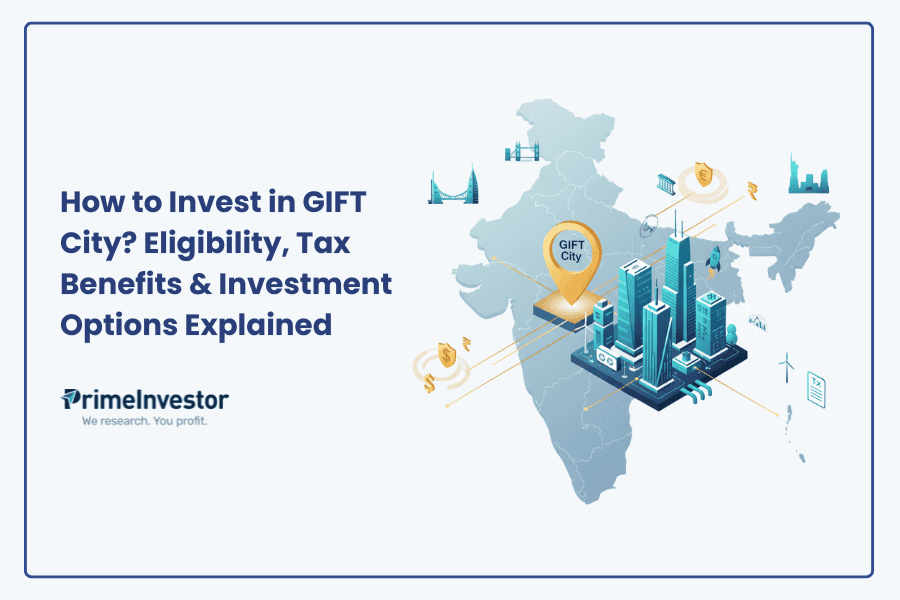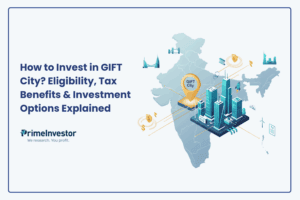The author is an experienced content writer and editor. She specializes in simplifying complex regulatory developments across tax, law, and finance for professionals and businesses. Her expertise spans domestic and international taxation, VAT, and financial regulations, with a focus on India, the UAE, and global markets. Views expressed are personal and not necessarily the views of PrimeInvestor. This article is educational in nature .Consult an expert for your own tax and regulatory needs.
Want to invest like the big players? Here’s an opportunity that is gaining serious traction. Around the world, International Financial Services Centres (IFSCs) have become hotspots for both institutional giants and everyday investors looking for smart investment opportunities. Places like the UAE and Singapore have seen massive trading volumes and enthusiastic investor participation. India established the GIFT City – the country’s first IFSC in Ahmedabad, Gujarat – back in 2015, and it’s now gaining serious momentum among investors.

Here’s what makes it exciting: India is rolling out the red carpet for individual investors willing to trade through the IFSC, offering substantial regulatory flexibility and attractive tax benefits. In this article, we’ll walk you through who can invest and what tax advantages you can unlock through GIFT City.
What exactly is GIFT City?
Think of Gujarat International Finance Tec-City – or GIFT City – as India’s answer to global financial hubs. Here’s the interesting twist: while it sits physically in India, it operates as a special zone that’s treated as being outside Indian territory for regulatory purposes.
All transactions happen in foreign currencies like USD, EUR, AED, and SGD. This “outside India” status means investors benefit from relaxed foreign exchange regulations under FEMA (India’s Foreign Exchange Management Act).
But there’s a catch – and it’s important. While you enjoy regulatory relaxations, you’re still subject to Indian tax laws, and your tax liability depends on your residential status in India.
Why is GIFT City different?
GIFT City answers to the International Financial Services Centres Authority (IFSCA), not the usual regulators like SEBI or RBI. This regulatory framework comes with modern safeguards: mandatory entity registration, strict reporting requirements, and a structured system for handling investor complaints.
Making Investments Though the GIFT City
At the individual level, HNIs, UHNIs and family offices have established portfolios in the GIFT City. It allows non-residents to have an exposure in the Indian markets and Indian residents to diversify their portfolio in the global markets.
Typically, individuals can make various investments in GIFT City in the form of:
- bank accounts or deposit accounts;
- shares, securities, debt instruments etc. traded on the IFSC exchanges (eg. India INX, NSEIX) by executing direct transactions or through Portfolio Management Services (PMS);
- units of pooling vehicles such as the Alternate Investment Funds (AIFs) or Mutual Funds; or
- Unsponsored Depository Receipts (UDRs) representing US stocks.
For the purpose of making these investments, individuals can open a bank account in GIFT City registered banks. Alternatively, individuals can also use their existing banks accounts (outside the GIFT City) to remit funds to the intermediary, broker or the pooling vehicle that is registered in the GIFT City.
Investment Eligibility
Resident Investors
Indian residents (as per FEMA) can invest in the GIFT City through banks and financial institutions registered there. This is enabled by the Liberalised Remittance Scheme (LRS) under FEMA applicable to individuals resident in India.
The LRS allows a resident individual to remit an amount up to USD 250,000 per financial year overseas for:
- investment purposes (capital account transactions); or
- for meeting expenses for medical, education or other purposes (current account transactions).
Further, a resident individual can open a Foreign Currency Account (FCA) with banks in the GIFT City. The FCAs can then be used to avail financial products and services offered by banks and financial institutions registered in the IFSC or for remitting overseas for any current or capital account transactions in foreign jurisdictions outside India. However, FCAs cannot be used to settle domestic transactions with other Indian residents.
Non-Resident Investors
Non-resident investors, whether NRIs or foreign nationals, can open bank accounts as well as investment accounts in a GIFT City intermediary by completing simple registration formalities. They can then use these accounts to make investments in India as well as anywhere else in the world.
All transactions in the GIFT City take place in foreign currencies. Thus, non-residents can invest in the Indian markets without the need to convert into INR. This is one of the biggest advantage for non-residents.
Investment Thresholds
By its very nature, global exposure requires financial backup and individual investors must be able to demonstrate the same. For instance, banks and mutual funds may also impose specific eligibility criteria, such as minimum net worth or minimum account balance requirements. Further, the minimum investment thresholds may vary depending on the financial product. For instance, AIFs require a minimum commitment of USD 150,000 (around INR 1.30 crores) for a fixed duration.
The upper threshold exists for resident investors under the LRS up to USD 250,000 (around INR 2.15 crores). This upper limit is not once-in-a-lifetime limit; it applies for each financial year allowing resident investors to freely remit the amount every year.
Exit Mechanism
Securities traded on GIFT City exchanges are generally liquid. They can be transferred anytime and proceeds can be transferred to the investor’s home country. However, certain investments like bonds or AIF units may be subject to a lock-in of 3-5 years depending on the terms of the investment.
Funds generated on the transfer, redemption or liquidation of IFSC securities can be freely remitted to the investor’s home country, unless there are any investment specific restrictions. In other words, the IFSC promotes full repatriation of investments made through it. This serves as an excellent opportunity for non-residents to reap the benefits of the Indian securities markets without any restriction on repatriation.(As per FEMA, non-residents can make investments in Indian securities from their NRE / NRO accounts. Proceeds credited to NRE accounts are fully repatriable while proceeds from NRO account can be repatriated only to the extent of USD 1 million per financial year).
Tax & Incidental Benefits
For Resident Investors
A resident individual is taxed in India on his global income. Thus, any income from investments or transactions executed on GIFT City exchanges is taxable in India. However, since the GIFT City is accorded a special status in India, there are other certain tax and incidental benefits of investing through the City. Some of them are as follows:
- You benefit from gains (if there are) arising from the appreciation of foreign currency;
- no transaction charges like Securities Transaction Tax (STT), Commodity Transaction Tax (CTT), stamp duty on trades executed on IFSC exchanges;
- tax exemption for certain income generated from IFSC, viz.
- proceeds from a life insurance policy issued by an IFSC unit; and
- income from AIF Cat III Funds( Income generated from AIF Cat III Funds is taxable in the hands of the Fund itself and is generally not taxable for the investors).
- capital gains on transfer of original shares/units to securities of a fund located in IFSC upon relocation.
Interest and dividend earned on IFSC investments are taxed at the slab rates applicable to individuals. Any foreign withholding tax (WHT) deducted by the payer can be claimed as a tax credit in India under the tax treaties.
Capital gains made on sale of securities are taxed as per the normal provisions in India, i.e., in case of listed securities long term capital gains (LTCG) is taxed at 12.50% on gains exceeding INR 125,000 and short term capital gains (STCG) is taxed at 20%. Tax rates applicable on the transfer of unlisted securities under the normal provisions will apply to IFSC investments too.
Further, any remittances to the GIFT City under LRS is subject to tax collection at source (TCS) at 20% on remittances exceeding INR 10 lakhs. TCS is in the nature of advance tax and is adjusted against the actual tax liability.
When it comes to disclosure in the tax return, GIFT City investments are considered as foreign investments. They must be reported in the tax return as foreign assets.
For Non-Resident Investors
In addition to the benefits available to resident investors, non-resident investors enjoy additional regulatory and tax benefits as follows:
- financial services rendered by IFSC intermediaries are exempt from Goods and Services Tax (GST), thus reducing the overall cost of investments;
- 10% tax on dividend received from an IFSC unit;
- interest on long-term or rupee-denominated bonds listed on an IFSC exchange after 1 July 2023 is subject to 9% WHT (4% WHT for bonds listed before that date );
- tax exemption for certain income generated in the GIFT City, viz.:
- capital gains on transfer of specific instruments like:
- derivatives
- rupee denominated bonds of Indian companies
- Global Depository Receipts (GDRs)
- foreign currency denominated bond
- unit of a Mutual Fund, business trust or AIF
- foreign currency denominated equity share of a company;
- any income from securities issued by a non-resident;
- any income from a securitisation trust (i.e., a trust that pools various financial assets like loans and receivables and issues tradeable securities backed by the underlying financial assets);
- capital gains on transfer of specific instruments like:
- exemption from Indian compliance requirements like procuring a permanent account number (PAN) or filing a tax return if WHT is deducted by the IFSC unit making the payment.
Conclusion
India’s GIFT City is a promising investment destination for individual investors looking for diversification and an exposure to overseas markets. Non-resident investors can benefit from investing in emerging economies like India. At the same time, resident investors can gain from investments in developed overseas markets.
The ecosystem around the GIFT City provides the requisite financial infrastructure for ease in facilitating transactions, eg. simple KYC norms for non-residents, longer trading hours and faster settlements. Though GIFT City investments carry the same risk factor as other market investments, the regulatory and tax benefits accorded make it an attractive investment destination.
Individual investors must, in consultation with their financial advisors, evaluate the benefits of making investments through the GIFT City vis-à-vis direct overseas investment (for resident investors) and investment through Indian bourses (for non-resident investors).
Besides, such investors must also evaluate the tax implications (taxability, reporting and treaty benefits) on IFSC investments in the event of a change in residential status, especially when global mobility and dual citizenship is quite prevalent.
Investing through IFSC is finding acceptance in the investment portfolios of family welfare trusts and family offices. Such offices are often on the lookout for avenues of better profitability and diversification while addressing the challenges of inheritance and succession.




6 thoughts on “How to Invest in GIFT City? Eligibility, Tax Benefits & Investment Options Explained”
Please share the current products available resident investor (Retail)
Sir, we are not a product provider or distributor in Gift City. This article is written by a external tax expert and her scope is limited to explanation. Please check with product providers or look up on the web. Thanks, Vidya
Thanks for detailed article, !, can you also provide comparison with other options such as Vested, IndMoney ?
Only those products available from GIFT City (recognised by the government) come within this ambit. You are talking of platforms offering foreign securities. They are not comparable and none of the benefits available to Gify City is available for normal foreign investing. Thanks, Vidya
One key item – can you please clarify. An NRE buys a MF in Gift City and later he converts his status to Resident upon return to India. Can the person continue to hold the MF units in USD as long as required ? Kindly confirm. As of last year, this was not clear, one fund house told it needs to be mandatorily redeemed.
Response from author: If a NRI returns to India for good and becomes a resident here, he can continue to hold the MFs held in IFSC units in USD. However, certain IFSC MF schemes may be restricted to NRIs only. Hence, it is important to update your KYC with the relevant MF house and check whether you can continue to hold units of the scheme.
Besides, change in residential status would have an impact on other aspects such as – taxation of income and capital gains on MFs, withholding tax implications, treaty benefits, disclosure of such MFs as foreign assets in tax return etc. These must be discussed with your tax advisor.